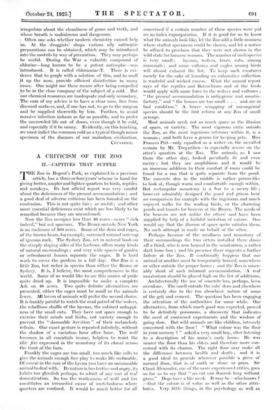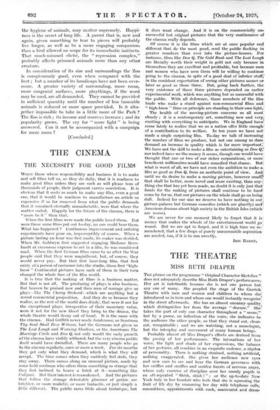rE IHE Zoo in Regent's Park, as explained in a previous
article, has a ,three or four years' scheme in hand for I giving better, ampler and lighter quarters to birds, reptiles and monkeys. Its last official report was very candid about the deficiences of the present accommodation ; and A good deal of adverse criticism has been founded on the confession. This is not quite fair ; or useful ; and other More essential deficienees exist which are less likely to be remedied because they are unconfessed.
Now the Zoo occupies less than 40 acres—acres " rich indeed," but not spacious., The Bronx outside New York is an enclosure of 500 acres. Some of the dens and cages, of the brown bears, for example, surround natural outcrop of igneous rock. The Sydney Zoo, set in natural bush on the steeply sloping sides of the harbour, offers many kinds of natural surroundings ; and very wide spaces of garden or refreshment houses separate the cages. It is hard work to cover the gardens in a full day. Our Zoo is a little Zoo, but richer in species than either -the Bronx or Sydney. It is, I believe, the most comprehensive in the World.. Some of us would like to see this source of pride quite dried up. It is impossible to make a complete Ark on 40 acres. Two quite definite alternatives are presented, either the cages must be small or the animals fewer. AC lovers of animals will prefer the second choice. It is frankly painful to watch the mad patrol of the wolves, the rebellious shuffle of the hyenas, the cabined unhappi- ness of the small cats. They have not space enough to exercise their minds and limbs, not variety enough to prevent the, " damnable iteration " of their melancholy refrain. One exact gesture is repeated infinitely, without the shadow of a variation hour after hour. The wolf becomes in all essentials insane, helpless to resist the idee fixe expressed in the monotony of its chasse across the front of the bars.
Frankly the cages are too small, too much like cells to give the animals enough free play to make life endurable. Of course in the case of the hyena you have an untameable animal to deal with. Its nature is too furtive and angry, its habits too ghoulish perhaps, to admit of any sort of real domestication. So -too the restlessness of wolf and fox constitutes an irremedial cause of wretchedness where quarters are confined. It would be much better for all Concerned if a certain number of these species were put on an index expurgatorius. If it is good for us to know what the animals look like, let the Zoo add a little musuem where stuffed specimens could be shown, and let a notice be affixed to proclaim that they were not shown in the wild state for humane reasons. The number of such species is very small : hyenas, wolves, foxes, cats, among mammals ; and some vultures and eagles among birds will almost -exhaust the list. To keep such creatures merely for the sake of hoarding an exhaustive collection is wasteful and wicked excess. What the annual report says of the reptiles and Batrachians and of the birds would apply with more force to the wolves and vultures : " the present accommodation is unhygienic and unsatis- factory," and " the houses are too small . . . and are in bad condition." A brave scrapping of uncongenial species should be the first reform at any Zoo of small acreage.
Most animals need, not so much space as the illusion of space, or variety. The most vigorous critic outside the Zoo, as the most ingenious reformer within it, is a woman ; and both have a genius for keeping pets. Miss Frances Pitt—only equalled as a writer on the so-called vermin by Mr. Tregarthen—is especially severe on the otter's quarters at the Zoo. The animals, as I saw them the other day, looked peculiarly fit and even merry ; but they are amphibious and it would be an immense addition to their Comfort if room could be found for a run that is quite separate from the pond. The concrete den in the middle is rather prison-like to look at, though warm and comfortable enough within. But rectangular monotony is a bar to a merry life ; however admirably designed the pond and prison bear no comparison for example with the ingenious and much enjoyed walks for the wading birds, or the charming ponds and haunts for beavers at the Bronx. The needs of the beavers arc not unlike the otters' and have been supplied by help of a faithful imitation of nature. One would say that the illusion of space quite satisfies them. No such attempt is made on behalf of the otter.
Perhaps because of the smallness and monotony of their surroundings the two otters installed there drove off a third, who is now housed in the sanatorium, a rather dark loose box ; and his presence there suggests a further failure at the Zoo. It continually happens that one animal or another must be temporarily housed, somewhere or other outside the proper house ; and the Zoo is miser- ably short of such informal accommodation. A real sanatorium should be placed high on the list of additions.
Architecturally the use of concrete has, perhaps, been overdone. The smell outside the cats' dens and elsewhere is certainly due to the too absorbent nature of some of the grit and cement. The question has been engaging the attention of the authorities for some while. One alternative, from which much good was expected, proved to be definitely poisonous, a discovery that indicates the need of continued experinients and the wisdom of going slow. But wild animals are like children, intensely concerned with the floor ! " What colour was the floor in your nursery ? " asked a very small boy, after listening to a description of his nurse's early home. He was nearer the floor than his elders and therefore more con- cerned with its charms. The right floor may make all the difference between health and death ; and it is a good ideal to provide wherever possible a piece of natural floor, that is of earth or stone or grass. Sir 'Claud Alexander, one of the more experienced critics, goes so far as to say that " no cat can flourish long without grass." Dogs have a like need. It may he—who knows ? —that the colour is of value as well as the other attri- butes. Very little things, in the psychology as well as the hygiene of animals, may matter supremely. Happi- ness is the secret of long life. A parrot that is, now and again, given something to tear to pieces will probably live longer, as well as be a more engaging companion, than a bird allowed no scope for its iconoclastic instincts. That much-misused cliché, the " repression complex," probably affects prisoned animals more than any other creature.
In consideration of its size and surroundings the Zoo is conspicuously good, even when compared with the best ; but a number of its handicaps have not been over- come. A greater variety of surrounding, more room, more congenial surfaces, more playthings, if the word may be used, are all demanded. They cannot be provided in sufficient quantity until the number of less tameable animals is reduced or more space provided. Is it alto- gether impossible to take in a little more of the Park ? The Zoo is rich ; its income and reserves increase ; and its popularity grows. The cry for " more light " is being answered. Can it not be accompanied with a campaign for more room ?
[Concluded.]































































 Previous page
Previous page